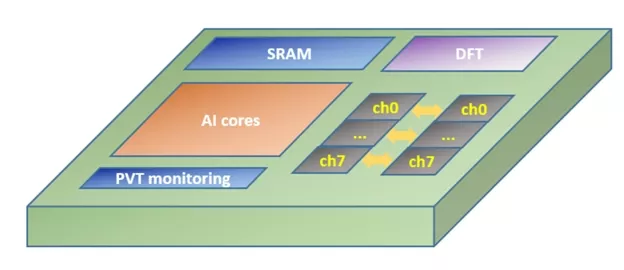Alchip Introduces 2nm Design Platform
Now available for High-Performance Computing and AI ASIC Designs
July 22, 2025 -- Alchip Technologies, the leader in high-performance and AI infrastructure ASICs, has received the first wafers from its groundbreaking 2nm Design Platform and is actively engaged with customers on high performance 2nm ASIC development.
The new 2nm Design Platform facilitates the physical design of a 2nm chip using multiple types of 2.5D/3D technologies. It supports the development of 5nm or 3nm IO chiplets that work in conjunction with 2nm compute dies. The complete physical design methodology supports technology up to 2nm, and advanced packaging including CoWoS®-S/R/L 2.5D/3D package, System on Integrated Chips (TSMC-SoIC®-X), die-to-die IP, and IO chiplet design. System on Wafer (TSMC-SoW™) 3DIC solutions are on track to be supported as well.
The 2nm process node introduces a complex layout structure, with a significantly greater variety of standard cells that make placement and signal/power routing more challenging. Alchip’s design methodology reduces turnaround time in both design implementation and verification by proactively addressing all side effects before floor planning and clock/power planning stages. From a packaging standpoint, power density and thermal dissipation per mm2 at the 2nm node are higher because of a larger gate count and faster operating speed. While 2nm IO chiplets are not yet available, Alchip’s 2nm Design Platform provides the more practical approach, enabling 2nm compute dies to work seamlessly with 3nm or 5nm IO chiplets.
Alchip’s 2nm test chip achieved first-pass silicon success, reinforcing the company’s high-performance ASIC leadership. The chip successfully integrated Alchip’s AP-Link-3D I/O IP, demonstrating its readiness for 3D SoIC-X chiplet applications. The results also lay a foundation for the company’s migration to TSMC’s A16™ process node.
“We’re open for business and ready to support customers’ 2nm demand. The 2nm Design Platform clearly showcases our ability to push the boundaries of high-performance computing and artificial intelligence design,” said Erez Shaizaf, CTO of Alchip Technologies.

Alchip’s 2nm test chip targets a gate all-around transistors structure
About Alchip
Alchip Technologies Ltd., founded in 2003 and headquartered in Taipei, Taiwan, is a leading global High-Performance Computing and AI infrastructure ASIC provider of IC and packaging design, and production services for companies developing complex and high-volume ASICs and SoCs. Alchip provides faster time-to-market and cost-effective solutions for SoC design at mainstream and advanced process technology. Alchip has built its reputation as a high-performance ASIC leader through its advanced 2.5D/3D CoWoS packaging, chiplet design, and manufacturing management. Customers include global leaders in artificial intelligence, high-performance computing, supercomputing, mobile communications, entertainment device, networking equipment, and other electronic product categories. Alchip is listed on the Taiwan Stock Exchange (TWSE: 3661).
Related Semiconductor IP
- JESD204E Controller IP
- eUSB2V2.0 Controller + PHY IP
- I/O Library with LVDS in SkyWater 90nm
- 50G PON LDPC Encoder/Decoder
- UALink Controller
Related News
- Marvell Announces Industry's First 2nm Platform for Accelerated Infrastructure Silicon
- SEALSQ Introduces QS7001, a Newly Developed Cutting-Edge RISC-V Secure Hardware Platform, Specifically Designed for IoT security in the Post-Quantum Era
- Alchip Announces Successful 2nm Test Chip Tapeout
- MediaTek Adopts AI-Driven Cadence Virtuoso Studio and Spectre Simulation on NVIDIA Accelerated Computing Platform for 2nm Designs
Latest News
- PQSecure Collaborates with George Mason University on NIST Lightweight Cryptography Hardware Research
- Omni Design Technologies Advances 200G-Class Co-Packaged Optics IP Portfolio for Next-Generation AI Infrastructure
- Global Annual Semiconductor Sales Increase 25.6% to $791.7 Billion in 2025
- Fabless Startup Aheesa Tapes Out First Indian RISC-V Network SoC
- SmartDV and Mirabilis Design Announce Strategic Collaboration for System-Level Modeling of SmartDV IP